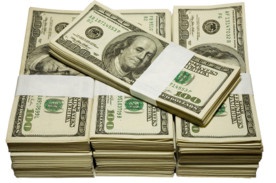
The US dollar is soaring in the foreign exchange market, selling around GH¢3.10 in some parts of the capital, despite the introduction of several measures by the Central Bank to bring the situation under control.
Average inter-bank exchange rates for the Ghana Cedi, as announced by the Ghana Association of Bankers for yesterday, said the US dollar was trading at GH¢2.8810 for buyers and selling at GH¢2.8836; but on the black market and in forex bureau, it has crossed the GH¢3.00 mark, with some selling it at GH¢3.10.
A visit by DAILY GUIDE to some forex bureau in parts of Accra confirmed that just five months into the year, the Cedi has been battered by the US dollar as a result of the quotation of importers. Ghana’s economy is largely dependent on imports with the Cedi losing about 30 percent of its value from the beginning of the year.
IMF Prescription
An International Monetary Fund (IMF) delegation that visited the country about two weeks ago averred that measures to arrest the falling value of the Ghana Cedi would not work unless specific underlying factors such as rising public spending and expenditure were addressed.
The IMF particularly expressed worry about the adverse effects of the Central Bank’s measures. It indicated that achieving the 2014 fiscal deficit target would be challenging, especially in the light of high interest rates, a depreciating currency, and a possible growth slowdown.
The Bank of Ghana, early in the year, announced measures to help halt the free fall of the Cedi by threatening pecuniary sanctions, jail terms, suspension and revocation of the operating licence of persons who flouted its rules.
In consequence, it also directed that all transactions in the country be conducted in Ghana Cedis in compliance with Bank of Ghana Notice dated October 10, 2012. However, the measures have not been able to tame the falling currency.
Dr Bawumia’s Advice
Dr. Mahamudu Bawumia, a former Deputy Governor of the Bank of Ghana, in March this year, warned the Central Bank that any attempt to solve the rapid depreciation of the Cedi by focusing on de-dollarization would ultimately be an exercise in futility.
Dr. Bawumia said while the law that mandated firms to quote prices in Cedis was a good law, the key to the problem of dollarization was for government to pursue policies that would stabilize the Cedi and thus make the dollar irrelevant in domestic transactions.
“On the issue of pricing goods in foreign currency in Ghana, it is the law that firms should be required to quote their prices in Cedis, the legal tender. It is a good law and should be enforced. While that is so, as long as the economic fundamentals are weak, there is no law that can stop any firm or individual from wanting to hold dollars as a store of value or thinking in dollar terms even though they price in Cedis.”
Banks’ frustration
Meanwhile, banks have started registering their displeasure about inadequate inflow of foreign exchange as their exporter customers are holding back their proceeds from exports.
The bankers said the Bank of Ghana directives on foreign exchange had slowed deposits into foreign currency accounts, while inflows from foreign exchange earnings abroad into foreign exchange accounts had also dwindled due to the unwillingness of exporters to transfer their proceeds.
With obvious lapses in the BoG panic measures, President John Mahama has given hints about the review of the measures introduced by the Bank of Ghana to curb the free fall of the Cedi. He said the review would address the unintended implementation flaws and also allay the fear of the public and the investor community.